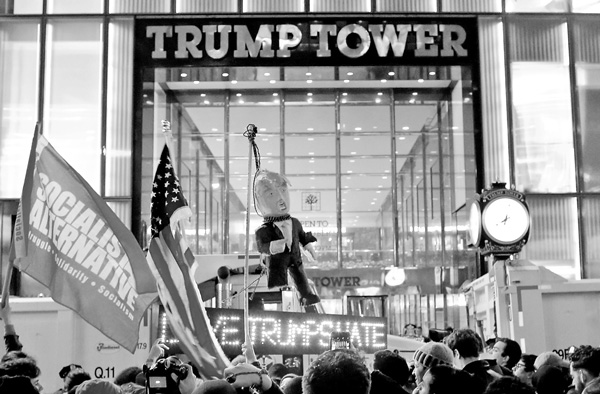11 Nov 2016 - {{hitsCtrl.values.hits}}

 Obama’s candidacy started on the streets of Chicago – Donald Trump’s candidacy began on the escalator of Trump Towers; Obama spoke of breaking down walls of discrimination – Trump spoke of building a wall from Mexico; Obama was celebrated as a candidate across the world – Trump was loathed; Trump was the anti-Obama – but ironically they both won based on the same message – CHANGE!
Obama’s candidacy started on the streets of Chicago – Donald Trump’s candidacy began on the escalator of Trump Towers; Obama spoke of breaking down walls of discrimination – Trump spoke of building a wall from Mexico; Obama was celebrated as a candidate across the world – Trump was loathed; Trump was the anti-Obama – but ironically they both won based on the same message – CHANGE!
As the dust is settling, here are a few thoughts on the election:
1. Clinton election strategy – Tried, tested, failed!
A few days ago, after the race tightened when FBI Director James Comey reopened the investigation into the Clinton emails, I tweeted that the Clinton campaign strategy to clash on Trump’s personality rather than policy was a mistake and I’ve been proven right. Obviously, hindsight is 20/20 and after the Access Hollywood tapes were released, up until the Comey’s October surprise, this election was effectively locked in. However, what was really jarring to me and something I noticed today as Trump gave his victory speech is that, Hillary Clinton pursued this same strategy in 2008 against Obama – and lost!
Recall that when faced with Obama’s unorthodox campaign strategy, Clinton’s main point of contention against Obama was his inexperience and never really on policy. At the time, this worked in his favour as he embraced the notion of being an outsider. Trump effectively brought out Obama’s playbook, albeit in a completely different tone, and attacked Clinton as the Washington insider. Almost exclusively attacking Trump on his personality/temperament may well have been a smart strategy if Clinton was liked and trusted by the electorate. However, she had considerably high disapproval ratings and consequently all it took was a reminder of her email history to erode her support. In fact, when she called Trump supporters “deplorables”, this helped them galvanise as a unit. Clinton could have easily beaten Trump on policy – because for starters, he didn’t propose any substantive policies except building a wall. In fact, when given the opportunity during the Presidential Debates, Clinton kept asking people to refer to her website to learn about her policies. In 2008, Obama beat her at this game by providing a different vision to the Bush/Clinton era of politics. Trump in 2016 beat her by identifying some key issues ingrained in American society and got away without any solutions because he was not pushed back on them. The irony is that Clinton won the Primary against Sanders by appealing to the voters that she represented a more realistic policy alternative – which got abandoned during the general election. In fact, even Bill Clinton won in 1992 on an economic policy platform with “It’s the Economy, stupid”. You can speak about an ignorant electorate, Comey’s emails, third party candidates and what not – but the underlying fact is – Hillary Clinton lost this election because of her own failings.
2. Tyranny of the working class
The working-class electorate, struggling in once flourishing industrial regions, voting in favour of a populist, anti-establishment choice - the similarities about this election result and the Brexit referendum are staggering! Much was made about Clinton’s democratic firewall and unfortunately for her, her electoral firewall was as strong as her Internet firewall. The Democratic Party took the blue-collar working class vote for granted and that overconfidence cost them. The warning signs were quite obvious as Bernie Sanders soared in popularity on the wave of blue-collar support. As I noted in a guest column on FrontPage, the fatal blow to the Clinton campaign was not struck in the so-called Swing States, but rather in the Rust Belt States of Michigan and Wisconsin. In fact, Clinton had not visited Wisconsin to campaign since winning the Democratic Party nomination whereas Trump actively campaigned in the region in order to appeal to the white, working-class vote. Splitting the blue-collar vote along with the sudden surge of rural conservative voters caused irreversible damage to the Clinton campaign.
Therefore, this election, similar to Brexit, is another reminder that mainstream parties cannot take their core constituencies for granted, especially given the rapid rise of anti-establishment candidates. There is no question that free trade and globalization create net benefits to countries. However, governments should also be cognisant of those who lose because of these developments and create necessary structures that minimise transition costs, rather than simply extol the virtues of global integration.
3. Obama coalition
Another false paradigm that is being shared across social media is that white men voted for Trump and overpowered the female vote. Rather surprisingly, exit polls suggest that Clinton received just 54 percent of female votes – significantly less than what was expected, given the perceived impetus to feminism in her role as the first female nominee from either major party for president or Trump’s disparaging comments about women. The outcome of the election, therefore, is a damning critique of some who attribute feminist achievement to electing individuals to office without recognising the subtle sensitivities associated within demographic divides. The Clinton campaign’s overconfidence has also affected turnout among minorities with Trump performing better than Romney among African Americans AND Latin Americans – yes, you read that right! More Latin Americans voted for Trump than they did for Mitt Romney. And then there’s also the low turnout among millennial voters, which sets off a completely new set of questions about campaign strategy, civic duties and ‘protest votes’.
4. Role of media
This election is undoubtedly the most divisive American election in my lifetime and Trump’s rhetoric is much to blame for that. Trump’s racist and bigoted rhetoric has mobilized the far-right movement and this has created a legitimate fear among minorities. The level of concern is even heightened with racist groups such as the KKK openly endorsing Trump and now taking credit for his election. If you haven’t already, listen to Van Jones articulate this concern on CNN. What must ask, then, how did such a candidate survive through the primaries, general election cycle and now get elected to the presidency of what is purported to be the symbol of liberal democratic ideals? Look no further than the media!
Donald Trump is effectively the manifestation of partisan manoeuvring by the Republican Party since Obama’s election in 2008. Political commentators such as Glenn Beck created this irrational fear among the Republican constituency about minorities, immigrants and other communities. Having created this toxic environment, Donald Trump elevated this rhetoric to the mainstream platform through his candidacy. Throughout the primary campaign, media outlets essentially provided Donald Trump with free media exposure amounting to almost US $ 2 billion according to a recent study.
American media outlets in particular have internalised this fallacy of neutrality meaning equal coverage. As a result, the media tends to cover elections similar to that of reality television rather than on issues. In such a situation, who better than the king of reality television to exploit the process to his benefit! Trump provided the sound bites, the tweets and the occasional policy suggestion (e.g. ban on Muslims entering the US) that kept the spotlight on him and validated his position as the representative of the Republican wing moulded during the Obama administration.
Therefore, Trump gained significant coverage that was not warranted based on his polling numbers, especially at the outset of the campaign. Media exposure and the inclination to normalise his statements catapulted him to the mainstream. Moreover, in order to preserve this perception of neutrality, for every negative news cycle created by Trump the media felt the need to also create a negative news cycle for Clinton and the subject of this attention was her emails. Even though Trump created more negative news items, they were not concentrated on one factor that would completely derail his candidacy. Towards the end of the campaign, it seemed that media across the spectrum recognised the risk of Trump’s rhetoric and attempted to check him, by which time it was too late. Clinton’s emails were arguably the most scrutinised subject in the media and as fate would have it, the issue would resurface at an ill-opportune moment for the campaign. Clinton obviously contributed to this by never addressing the email issue directly and moving on.
What next?
If anyone says that they know how the Trump presidency will impact their country, they’re lying! He’s been so thin on substantive policy that any impact study lends on conjecture. If Trump follows through on his anti-trade policies, especially by repealing NAFTA and imposing high tariffs on Chinese imports, the US will very likely experience an immediate economic downturn. This possibility is also reflected in global markets falling significantly when the prospect of Trump winning became evident. Trump’s greatest challenge is a domestic one – uniting a fractured country. This effort would require bipartisan support and Clinton’s decision not to publicly concede the election when it became obvious was quite distasteful.
Beyond that, with a Republican House and Senate, a highly conservative economic and social agenda will be pushed through. Most significantly, he will have an opportunity to appoint at least one Supreme Court Justice (with the potential for more) during his term. This would undoubtedly have significant long-term repercussions to the American social fabric.
Donald Trump is a lot of things, but he is no idiot and he demonstrated that by ochestrating one of the most unexpected election victories in American history. It is equally important to recognise that there is a growing disconnect between the political elite and the common voter. If mainstream political parties wish to be relevant then it is imperative that they shed the notion of an “ignorant voter”, recognise their concerns, and provide viable solutions. Failure to provide responsible solutions will only incentivise more fringe politics.
Trump has promised change. How he achieves this change is a million dollar question. Who knows, maybe he’s got the answers since he knows a lot about “small loans of million dollars”!
(Kithmina is a political-economist working at the Institute of Policy Studies of Sri Lanka (IPS). He was an undergraduate at the Johns Hopkins University and completed his master’s degree at the University College London (UCL).
Views expressed here are strictly the author’s own)
10 Jan 2025 18 minute ago
10 Jan 2025 33 minute ago
10 Jan 2025 38 minute ago
10 Jan 2025 1 hours ago
10 Jan 2025 1 hours ago